
Filter News
Area of Research
- (-) Materials (107)
- (-) Supercomputing (138)
- Advanced Manufacturing (6)
- Biology and Environment (62)
- Building Technologies (2)
- Clean Energy (110)
- Climate and Environmental Systems (1)
- Computational Biology (1)
- Computational Engineering (3)
- Computer Science (15)
- Electricity and Smart Grid (1)
- Energy Sciences (1)
- Functional Materials for Energy (1)
- Fusion and Fission (29)
- Fusion Energy (13)
- Isotope Development and Production (1)
- Isotopes (4)
- Materials for Computing (17)
- Mathematics (1)
- National Security (24)
- Neutron Science (28)
- Nuclear Science and Technology (17)
- Quantum information Science (8)
News Topics
- (-) Computer Science (98)
- (-) Frontier (28)
- (-) Fusion (8)
- (-) Microscopy (29)
- (-) Partnerships (11)
- (-) Physics (34)
- (-) Polymers (18)
- (-) Quantum Computing (20)
- (-) Space Exploration (5)
- (-) Sustainable Energy (19)
- 3-D Printing/Advanced Manufacturing (26)
- Advanced Reactors (5)
- Artificial Intelligence (38)
- Big Data (19)
- Bioenergy (18)
- Biology (14)
- Biomedical (22)
- Biotechnology (2)
- Buildings (8)
- Chemical Sciences (32)
- Clean Water (3)
- Climate Change (21)
- Composites (9)
- Coronavirus (17)
- Critical Materials (15)
- Cybersecurity (8)
- Decarbonization (11)
- Energy Storage (37)
- Environment (34)
- Exascale Computing (22)
- Grid (9)
- High-Performance Computing (40)
- Irradiation (1)
- Isotopes (13)
- ITER (1)
- Machine Learning (14)
- Materials (79)
- Materials Science (83)
- Mathematics (1)
- Molten Salt (3)
- Nanotechnology (42)
- National Security (8)
- Net Zero (2)
- Neutron Science (42)
- Nuclear Energy (20)
- Quantum Science (32)
- Renewable Energy (1)
- Security (6)
- Simulation (14)
- Software (1)
- Summit (42)
- Transformational Challenge Reactor (3)
- Transportation (19)
Media Contacts
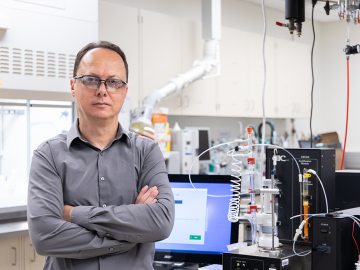
An innovative and sustainable chemistry developed at ORNL for capturing carbon dioxide has been licensed to Holocene, a Knoxville-based startup focused on designing and building plants that remove carbon dioxide
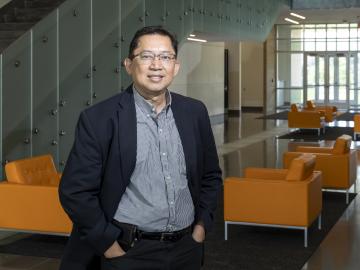
Rigoberto Advincula, a renowned scientist at ORNL and professor of Chemical and Biomolecular Engineering at the University of Tennessee, has won the Netzsch North American Thermal Analysis Society Fellows Award for 2023.
For the third year in a row, the Quantum Science Center held its signature workforce development event: a comprehensive summer school for students and early-career scientists designed to facilitate conversations and hands-on activities related to
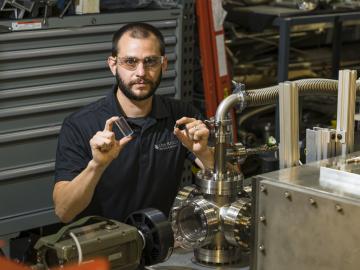
ORNL will team up with six of eight companies that are advancing designs and research and development for fusion power plants with the mission to achieve a pilot-scale demonstration of fusion within a decade.
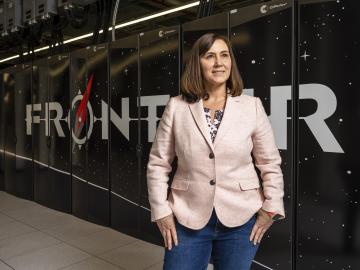
At the National Center for Computational Sciences, Ashley Barker enjoys one of the least complicated–sounding job titles at ORNL: section head of operations. But within that seemingly ordinary designation lurks a multitude of demanding roles as she oversees the complete user experience for NCCS computer systems.
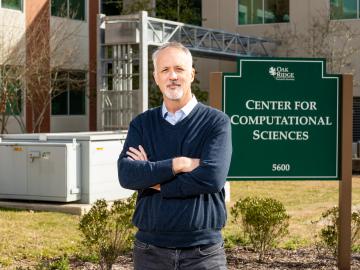
The Oak Ridge Leadership Computing Facility’s Matt Sieger has been named the project director for the OLCF-6 effort. This next OLCF undertaking will plan and build a world-class successor to the OLCF’s still-new exascale system, Frontier.
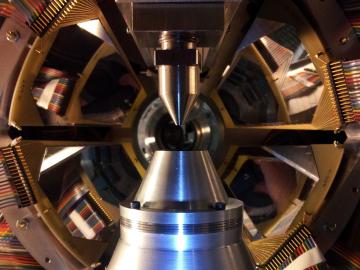
Led by Kelly Chipps of ORNL, scientists working in the lab have produced a signature nuclear reaction that occurs on the surface of a neutron star gobbling mass from a companion star. Their achievement improves understanding of stellar processes generating diverse nuclear isotopes.
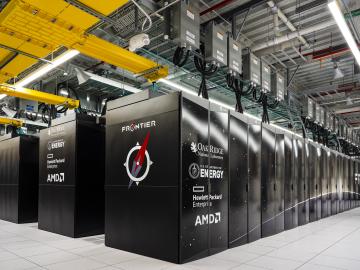
With the world’s first exascale supercomputing system now open to full user operations, research teams are harnessing Frontier’s power and speed to tackle some of the most challenging problems in modern science.

Researchers used Oak Ridge National Laboratory’s Quantum Computing User Program to perform the first independent comparison test of leading quantum computers.
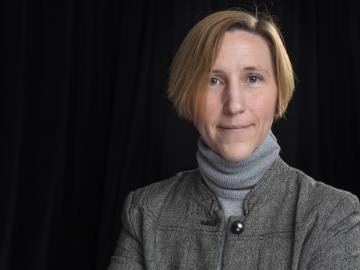
Kelly Chipps, a nuclear astrophysicist at ORNL, has been appointed to the Nuclear Science Advisory Committee, or NSAC. The committee provides official advice to DOE and the National Science Foundation, or NSF, about issues relating to the national program for basic nuclear science research.


